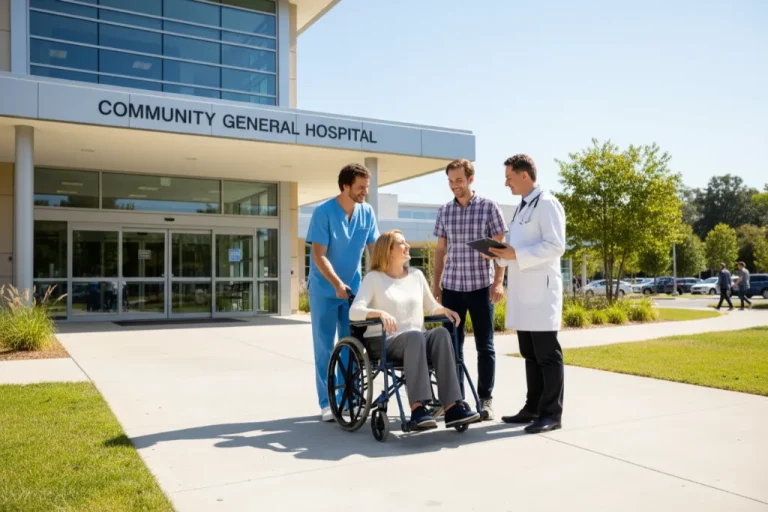What is a Community Psychiatric Nurse?
A community psychiatric nurse is a specialist mental health professional who works within community settings to support people with mental health challenges. Their role involves assessing, diagnosing, and managing mental health difficulties while helping people transition from hospital care to living independently in the community. CPNs often work closely with other healthcare professionals, social workers, and families to ensure that people receive holistic, person-centred care tailored to their specific needs.
CPNs play a crucial role in mental health services, providing ongoing support through medication management, therapeutic interventions, and crisis prevention. Their work is particularly valuable in ensuring continuity of care and helping people manage long-term mental health conditions while promoting recovery and well-being in community settings.
The Role of a Community Psychiatric Nurse
Community psychiatric nurses play a vital role in delivering mental health support to people in their own homes or community settings. Their responsibilities extend beyond clinical care, as they provide emotional support, practical assistance, and guidance to help people manage their mental health challenges. CPNs collaborate closely with multidisciplinary teams, including social workers, occupational therapists, and GPs, to ensure comprehensive care. They are also responsible for creating care plans, monitoring progress, and adjusting interventions as needed.
In addition to managing medication and offering therapeutic support, CPNs focus on promoting independence and recovery. They work to build trusting relationships with people, helping them to navigate complex transitions from hospital care to community life. By addressing both clinical and social factors, CPNs help reduce hospital readmissions and empower people to lead fulfilling lives within their communities.
Responsibilities of CPNs in Community Transition Services
Community psychiatric nurses are essential in ensuring smooth transitions for people transitioning from hospital-based care to community settings. Their work in Community Transition Services is vital for reducing readmissions, improving mental health outcomes, and helping people adapt to life outside of hospital care. CPNs take on various responsibilities, from coordinating with mental health professionals and families to ensuring that people receive the right support at every stage of their recovery.
Discharge Planning
One of the key responsibilities of community psychiatric nursing in Community Transition Services is discharge planning. CPNs work closely with hospital teams, social workers, and families to develop detailed, personalised plans that support people leaving hospital care. These plans often include medication management, follow-up appointments, and referrals to additional services like counselling or occupational therapy. The goal is to ensure that each person receives the appropriate care once they return to the community, reducing the risk of hospital readmission.
CPNs also focus on preparing people for life outside the hospital by offering practical support, such as arranging housing or financial assistance if needed. Their ongoing involvement post-discharge helps people maintain stability and well-being as they adjust to life in the community, ensuring that mental health and social needs are addressed.
In-Depth Assessments
CPNs are responsible for conducting in-depth mental health assessments as part of their role in CTS. These assessments go beyond just evaluating the immediate symptoms, delving into the person’s overall psychological and physical health, personal history, social circumstances, and the broader factors affecting their well-being. By thoroughly understanding the person’s needs, CPNs can create personalised care plans that address both the clinical and social aspects of recovery. These assessments are crucial in identifying risks, such as potential relapse or self-harm, and ensuring that appropriate measures are taken to mitigate them.
Assessments also involve close collaboration with other healthcare professionals, such as psychiatrists, GPs, and occupational therapists, to comprehensively understand a person’s history, needs, and well-being. The information gathered helps CPNs tailor their care to support long-term recovery and promote stability in the community setting.
Therapeutic Interventions
Community psychiatric nurses provide a range of therapeutic interventions to support the mental health and well-being of people in their care. These interventions can include cognitive behavioural therapy (CBT), counselling, and crisis management techniques. CPNs work closely with individuals to develop coping strategies for managing stress, anxiety, and other mental health challenges. By offering consistent, therapeutic support, CPNs help foster resilience and independence, encouraging people to actively participate in their recovery.
Additionally, CPNs often provide psychoeducation, teaching care recipients and their families about the nature of mental health challenges, treatment options, and ways to promote long-term well-being. This proactive approach helps people better understand their mental health, which is crucial for preventing future crises and maintaining stability in the community.
Care Coordination
Care coordination is a core responsibility of CPNs, particularly in CTS. They act as the central link between healthcare providers, ensuring that people receive seamless, integrated care across various services. This includes liaising with social workers, GPs, mental health services, and community organisations to address each aspect of a person’s care. By coordinating these services, CPNs help prevent gaps in care that can lead to setbacks or hospital readmissions.
CPNs also ensure that care plans are regularly reviewed and adjusted based on the person’s progress. This continuous monitoring ensures that care remains relevant and effective, allowing people to receive the right support at the right time. Through strong communication and collaboration, CPNs create a network of care that supports long-term recovery and promotes overall well-being.
Significance of CPNs in Community Mental Health Care
Community psychiatric nurses are integral to the success of community mental health care, offering a bridge between hospital-based care and ongoing support in the community. Their role is essential in promoting long-term recovery, ensuring continuity of care, and addressing the social, emotional, and clinical needs of people with mental health challenges. CPNs focus on the person receiving care and support families and caregivers, providing a comprehensive approach to mental health management.
Promoting Recovery and Rehabilitation
CPNs are crucial in promoting recovery and rehabilitation by focusing on holistic, person-centred care. They empower people to take control of their mental health through tailored care plans, therapeutic interventions, and consistent support. CPNs help care recipients build coping mechanisms, manage symptoms, and navigate the challenges of everyday life, all while encouraging independence. Their emphasis on rehabilitation goes beyond immediate symptom management, fostering long-term recovery that allows people to reintegrate into their communities and live fulfilling lives.
Through regular follow-ups and check-ins, CPNs ensure that the people they serve stay on track with their care plans and make progress towards recovery. They provide a stable source of support during transitions and help prevent crises by offering timely interventions when needed.
Supporting Families and Caregivers
In addition to supporting people receiving care, CPNs are also key in helping families and caregivers manage the complexities of mental health. They provide education about the person’s unique challenges, helping families understand the difficulties their loved ones face and how best to support them. CPNs offer guidance on coping strategies and maintaining a supportive home environment, ensuring that caregivers and families feel equipped to handle their responsibilities.
Moreover, CPNs act as a point of contact, offering emotional support and practical advice. This helps reduce stress and potential burnout and strengthens the overall support network, which is critical for the person’s recovery journey.
Reducing Hospital Readmissions
Reducing hospital readmissions is one of the primary goals of CPNs in community mental health care. By providing proactive, ongoing support and closely monitoring the people they serve after discharge, CPNs help prevent the escalation of mental health concerns that could lead to readmissions. Their focus on early intervention, crisis management, and medication adherence helps people maintain their well-being in the community and minimises the need for emergency care.
CPNs also ensure that care is well-coordinated across different services, addressing both mental health and social factors. This integrated approach improves outcomes and reduces the strain on hospital resources by keeping people well-supported in their communities.
Community Transition Services With Nurseline Healthcare
At Nurseline Healthcare, our Community Transition Services are designed to provide comprehensive support for people transitioning from hospital care back into the community. Our goal is to ensure that each person experiences a smooth, well-coordinated transition with the right level of care, helping them regain their independence and stability in a community setting. We work closely with healthcare professionals, social workers, and families to develop personalised care plans that address both mental health needs and the social factors that influence well-being. This holistic approach ensures that every person receives tailored support that empowers them to lead fulfilling lives.
Our case studies showcase the success of our CTS programme, highlighting real-life examples of people who have successfully transitioned to community care with the help of our dedicated team. From managing complex mental health challenges to supporting people with a learning disability, Nurseline Healthcare is committed to providing the highest quality care. Our proactive approach includes early intervention, therapeutic support, and continuous monitoring to ensure the people we support remain stable and receive ongoing assistance. By focusing on long-term recovery and reducing hospital readmissions, we help people thrive in their communities.
Choosing Nurseline Healthcare means choosing a partner committed to delivering person-centred care.
With our expertise in Community Transition Services, we offer the right support at the right time, ensuring that each person’s transition is successful and sustainable.






